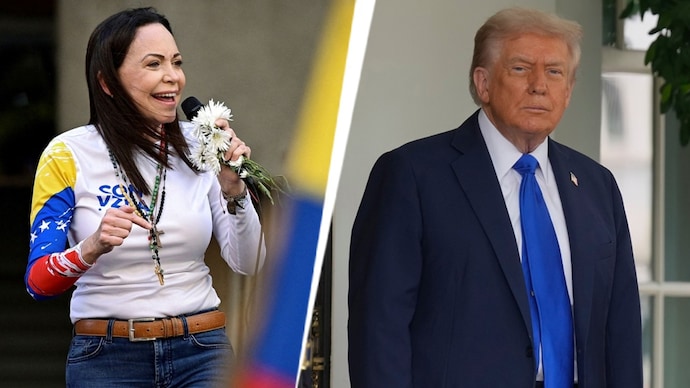
- A Message Hidden in the Nobel Committee’s Choice
- Democracy Under Pressure: Trump’s Troubled Legacy
- Machado vs. Maduro: A Struggle for Venezuela’s Soul
- The U.S. Aggression and Global Repercussions
- A Woman’s Victory and a Symbolic Defeat for Trump
- Trump’s Reaction and the Nobel Committee’s Subtle Response
- The Final Blow: Salt on Trump’s Wounds
The Norwegian Nobel Committee has once again stirred political waves — this time by awarding the Nobel Peace Prize 2025 to Maria Corina Machado of Venezuela. The decision, hailed as a triumph for democracy, is also being seen as a subtle but powerful snub to former U.S. President Donald Trump, who has long craved the Peace Prize recognition he never received.
While Trump’s desire for the Nobel Peace Prize was no secret, the committee’s choice of Machado — a woman known for defending democracy amid dictatorship — was a deliberate statement. It reminded the world that the Peace Prize is earned through moral conviction and sacrifice, not through loud self-promotion or political theatrics.
A Message Hidden in the Nobel Committee’s Choice
Few outside Latin America had heard of Maria Corina Machado before her Nobel victory. Yet, her quiet persistence in opposing Venezuelan President Nicolás Maduro’s regime has now earned her global recognition. The committee’s decision to favor a little-known activist over one of the world’s most famous figures — Donald J. Trump — was as symbolic as it was intentional.
The Nobel Committee’s move essentially contrasts two global figures: a woman who protects democracy and a man accused of undermining it. By celebrating Machado’s resilience, the committee has implicitly criticized Trump’s authoritarian tendencies, particularly his use of state power to suppress opposition and manipulate democratic systems during his presidency.
Democracy Under Pressure: Trump’s Troubled Legacy
In recent years, political observers have accused Trump of leading the backsliding of American democracy — centralizing power, misusing legal systems to silence critics, and fueling division. His rhetoric and decisions, including the controversial deployment of military forces within U.S. cities, have been seen as deeply anti-democratic.
The Nobel Peace Prize Committee’s decision to reward someone who champions freedom and democratic institutions thus feels like a direct counterpoint to Trump’s legacy. In the words of one observer, “It’s not just a Nobel for peace; it’s a Nobel for principle.”
Machado vs. Maduro: A Struggle for Venezuela’s Soul
Maria Corina Machado, the leading opposition figure in Venezuela, has long stood against President Nicolás Maduro’s authoritarian rule. While she chose to fight through elections and peaceful activism, Trump’s approach toward Venezuela involved sanctions, threats, and military posturing.
Ironically, Machado once thanked Trump after he increased the bounty for Maduro’s capture to $50 million. Yet, despite their shared opposition to Maduro, their methods could not be more different. Machado embodies democratic resistance; Trump relies on power and pressure.
The U.S. Aggression and Global Repercussions
Under Trump, the U.S. administration pushed an aggressive stance toward Venezuela. In September, U.S. Attorney General Pam Bondi labeled Maduro as “one of the most powerful drug traffickers in the world” — a claim lacking concrete evidence. Within hours, 4,000 U.S. troops were deployed to the Caribbean region, escalating global tensions.
For many, these actions only deepened fears that Trump might authorize a military invasion of Venezuela. Against that backdrop, the Nobel Committee’s decision to honor Machado — someone who resists dictatorship peacefully — stands as a clear rejection of militarized politics.
A Woman’s Victory and a Symbolic Defeat for Trump
The optics of a woman winning over Trump add another layer of meaning. While Machado is hailed as “Venezuela’s Iron Lady”, Trump remains notorious for his toxic masculinity and history of sexist remarks — from his infamous “Grab ’em by the pu**y” comment to his associations with the late Jeffrey Epstein.
Where Trump thrives on provocation, Machado represents composure and conviction. She is eloquent, fearless, and determined — traits that starkly contrast with Trump’s bluster and impulsiveness. The Nobel Committee’s decision, therefore, carries both political and gender symbolism — a victory of strength with dignity over power with arrogance.
Trump’s Reaction and the Nobel Committee’s Subtle Response
Predictably, Trump and his allies — including Howard Lutnick, Peter Navarro, and Scott Bessent — have criticized the decision. They argue that Trump’s diplomatic efforts, including his claims of “stopping eight wars,” were overlooked. But as the Nobel Committee Chairman Jorgen Watne Frydnes calmly noted, the committee receives “thousands and thousands of letters every year” claiming contributions to peace — a polite way of dismissing Trump’s self-nomination.
Frydnes added that the Nobel Committee meets “in a room surrounded by portraits of laureates filled with courage and integrity.” Those two words — courage and integrity — serve as an unmissable rebuke to Trump and everything he symbolizes.
The Final Blow: Salt on Trump’s Wounds
In essence, the Nobel Committee has managed to wound Trump’s pride while celebrating Machado’s courage. It was not enough to deny him the prize; by awarding it to someone who embodies his political opposite, they’ve added salt to his wounds.
Still, this award is not merely about symbolism. Maria Corina Machado truly deserves global recognition for her unwavering fight for democracy and human rights in Venezuela. Her Nobel Peace Prize is not an act of provocation — it’s an act of justice.
And while Trump might continue to nurse his wounded ego, the rest of the world has found a new inspiration in Machado — proof that courage, integrity, and conviction still define true leadership.
For breaking news and live news updates, like us on Facebook or follow us on Twitter and Instagram. Read more on Latest World on thefoxdaily.com.





COMMENTS 0